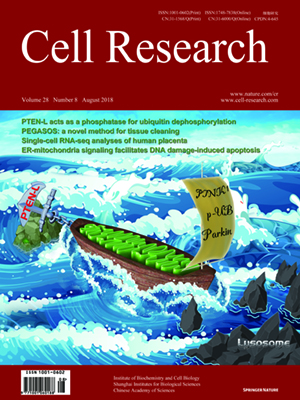
Volume 28, No 8, Aug 2018
ISSN: 1001-0602
EISSN: 1748-7838 2018
impact factor 17.848*
(Clarivate Analytics, 2019)
Volume 28 Issue 8, August 2018: 862-864
LETTERS TO THE EDITOR
Exosomal PD-L1 harbors active defense function to suppress T cell killing of breast cancer cells and promote tumor growth
Yi Yang 1, Chia-Wei Li 1, Li-Chuan Chan 1,2, Yongkun Wei 1, Jung-Mao Hsu 1, Weiya Xia 1, Jong-Ho Cha 1, Junwei Hou 1,Jennifer L. Hsu 1, Linlin Sun 1,3 and Mien-Chie Hung 1,2
1Department of Molecular and Cellular Oncology, The University of Texas MD Anderson Cancer Center, Houston, TX 77030, USA; 2Graduate School of Biomedical Sciences, The University of Texas Health Science Center at Houston, Houston, TX 77030, USA and 3Tianjin Key Laboratory of Lung Cancer Metastasis and Tumor Microenvironment, Lung Cancer Institute, Tianjin Medical University General Hospital, Tianjin 30052, China
Correspondence: Correspondence: Mien-Chie Hung (mhung@mdanderson.org)
Dear Editor,
The tumor-microenvironment interactions play important roles in tumor progression, metastasis, and therapeutic resistance,1 and increasing evidence indicates that tumor cell-derived exosomes can systematically modulate or reprogram the tumor microenvironment by transferring molecules, such as microRNAs, mRNAs, and proteins from donor cells to recipient cells.2 PD-L1 is a classical immune surface protein, which inhibits anti-tumor function of T cells by binding to its receptor programmed cell death-1 (PD-1) and effectively protects tumor from immune surveillance.3 Exosomes have been reported to contain certain types of proteins, including membrane proteins, e.g., EGFR and MET, that promote cancer metastasis.4,5 As a membrane-bound protein, whether PD-L1 exists in cancer cell-derived exosomes and whether it plays a role in tumor progress are largely unknown.
https://doi.org/10.1038/s41422-018-0060-4
FULL TEXT | PDF
Browse 2166


